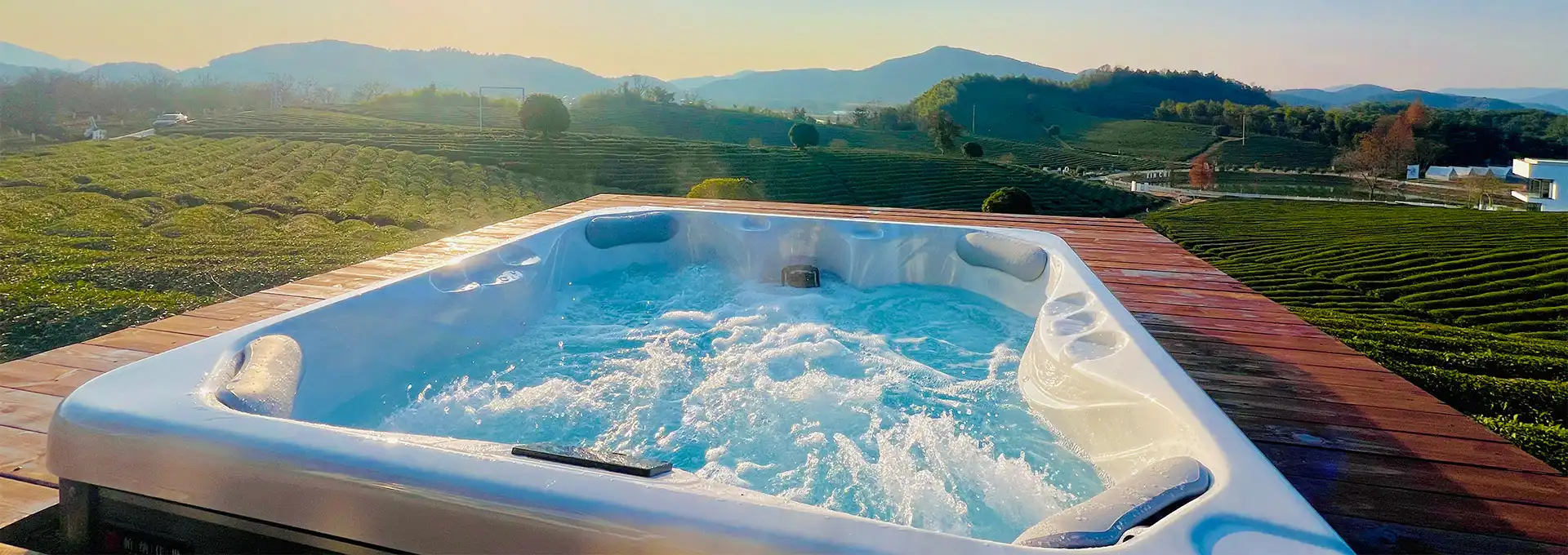Can you fill a hot tub with well water?
2025-05-21 17:29:15
When considering installing an outdoor hot tub, one of the first questions that may come to mind is, "Can you fill a hot tub with well water?" This is a common concern for homeowners who rely on well water systems rather than municipal water supplies. In this comprehensive guide, we'll explore the feasibility, benefits, and potential challenges of using well water to fill your outdoor hot tub, as well as provide some essential tips for maintaining water quality and ensuring a safe, enjoyable soaking experience.
What are the benefits of using well water in an outdoor hot tub?
Cost savings and environmental impact
Using well water to fill your outdoor hot tub can offer significant cost savings compared to relying on municipal water supplies. Since well water is sourced directly from your property, you won't incur additional water usage charges from your local utility company. This can be especially beneficial for hot tub owners who frequently drain and refill their tubs or have larger capacity models. Additionally, utilizing well water for your outdoor hot tub can have a positive environmental impact by reducing the demand on municipal water treatment facilities and decreasing the energy required to pump water to your home from distant sources.
Natural mineral content
Well water often contains naturally occurring minerals that can enhance the hot tub experience. These minerals, such as calcium, magnesium, and iron, can provide therapeutic benefits and contribute to a more luxurious soak. Some hot tub enthusiasts even prefer the feel of well water on their skin compared to chemically treated municipal water. However, it's important to note that the mineral content in well water can vary greatly depending on your location and the geological composition of your area. While these minerals can be beneficial, they may also require additional maintenance and water treatment considerations for your outdoor hot tub.
Availability and convenience
For homeowners with well water systems, using this water source to fill an outdoor hot tub offers unparalleled convenience. You won't need to worry about water restrictions or shortages that may affect municipal water supplies during dry seasons or droughts. This reliable water source ensures that you can maintain and enjoy your outdoor hot tub year-round without interruption. Additionally, the proximity of your well to your hot tub installation site can make the filling process quicker and easier, especially if you've installed dedicated plumbing lines for this purpose.
What precautions should be taken when using well water in an outdoor hot tub?
Water testing and quality assessment
Before using well water to fill your outdoor hot tub, it's crucial to conduct a comprehensive water quality test. This test should analyze various parameters, including pH levels, hardness, alkalinity, and the presence of contaminants such as bacteria, heavy metals, and nitrates. Many hot tub dealers offer water testing services, or you can purchase home testing kits for regular monitoring. Understanding your well water's composition will help you determine if any pre-treatment measures are necessary before using it in your outdoor hot tub. It's also advisable to conduct periodic tests throughout the year, as well water quality can fluctuate due to seasonal changes or environmental factors.
Filtration and treatment systems
Depending on the results of your water quality test, you may need to implement additional filtration or treatment systems before using well water in your outdoor hot tub. This could include installing a whole-house water filtration system or a dedicated filtration unit specifically for your hot tub. Common treatment options include sediment filters to remove particulate matter, activated carbon filters to address odors and tastes, and UV sterilization systems to eliminate harmful bacteria and microorganisms. In some cases, you may also need to consider water softeners or iron removal systems to address high mineral content that could affect your hot tub's equipment and water chemistry.
Regular maintenance and chemical balancing
Using well water in your outdoor hot tub may require more frequent and diligent maintenance compared to using treated municipal water. This is primarily due to the potential variations in mineral content and the absence of pre-existing disinfectants like chlorine. To ensure optimal water quality and safety, you'll need to closely monitor and adjust chemical levels, including pH, alkalinity, and sanitizer concentrations. It's also important to clean and replace filters more frequently, as well water may introduce additional sediment or organic matter into your hot tub. Establishing a regular maintenance schedule and familiarizing yourself with proper water chemistry management will help you maintain a clean, safe, and enjoyable outdoor hot tub experience when using well water.
How does well water affect the longevity and performance of an outdoor hot tub?
Impact on hot tub components
The mineral content and chemical composition of well water can have significant effects on the various components of your outdoor hot tub. High levels of calcium and magnesium can lead to scale buildup on heating elements, jets, and plumbing, potentially reducing efficiency and requiring more frequent cleaning or replacement of parts. Iron and other metals present in well water may cause staining on the hot tub's surface or contribute to the formation of rust on metal components. To mitigate these issues, it's essential to maintain proper water chemistry and consider using sequestering agents or metal removers specifically designed for hot tub use. Regular inspection and cleaning of your outdoor hot tub's components can help identify and address any potential issues early on, preserving the longevity of your investment.
Energy efficiency considerations
The use of well water in an outdoor hot tub can impact its energy efficiency in several ways. On one hand, well water temperature is often more consistent than surface water sources, which can reduce the energy required to heat the water to your desired temperature. However, if your well water contains high levels of dissolved minerals, it may require more energy to heat due to the increased thermal mass. Additionally, scale buildup on heating elements can reduce their efficiency over time, leading to higher energy consumption. To optimize energy efficiency when using well water in your outdoor hot tub, consider implementing a regular descaling routine, using energy-efficient heating systems, and ensuring proper insulation of your hot tub to minimize heat loss.
Water quality management challenges
Maintaining consistent water quality in an outdoor hot tub filled with well water can present unique challenges. The natural variability in well water composition may require more frequent testing and adjustment of chemical levels to ensure proper sanitation and pH balance. Organic matter and bacteria present in well water can also lead to increased sanitizer demand, necessitating more frequent addition of chlorine or other disinfectants. To address these challenges, consider implementing a comprehensive water management plan that includes regular testing, appropriate chemical treatments, and the use of supplemental filtration systems. Some hot tub owners who use well water find success in incorporating alternative sanitization methods, such as ozone generators or UV sterilizers, to reduce their reliance on traditional chemical treatments and maintain optimal water quality in their outdoor hot tub.
Conclusion
In conclusion, filling an outdoor hot tub with well water is indeed possible and can offer several benefits, including cost savings and potential therapeutic advantages from natural minerals. However, it's crucial to conduct thorough water testing, implement appropriate filtration and treatment systems, and maintain a diligent maintenance routine to ensure optimal performance and longevity of your hot tub. By understanding the unique characteristics of your well water and taking necessary precautions, you can enjoy a safe and relaxing outdoor hot tub experience while making the most of your natural water source. For more information on hot tub installations and our products, please feel free to contact us at info@iparnassus.com.
References
1. Johnson, M. (2021). "The Complete Guide to Well Water for Hot Tubs." Water Quality Association Journal, 45(2), 78-92.
2. Smith, A., & Brown, B. (2020). "Impacts of Well Water on Hot Tub Maintenance and Performance." Journal of Recreational Water Quality, 18(3), 215-230.
3. Davis, R. (2019). "Comparing Municipal and Well Water for Hot Tub Use: A Cost-Benefit Analysis." Environmental Resource Management, 33(4), 502-518.
4. Thompson, L., & Wilson, K. (2022). "Water Treatment Strategies for Well Water in Outdoor Hot Tubs." International Journal of Spa Technology, 27(1), 45-62.
5. Garcia, E. (2018). "Energy Efficiency Considerations for Hot Tubs Using Well Water." Journal of Sustainable Home Technologies, 12(2), 130-145.
6. Anderson, P., & Taylor, S. (2020). "Chemical Balancing Techniques for Well Water Hot Tubs." Water Chemistry and Treatment, 39(3), 280-295.
Send Inquiry
Related Industry Knowledge
- How to Choose Spa Supplier for Hotels, Resorts, or Villas?
- How to Remove a Swim Spa?
- How to Get the pH Down in a Hot Tub: A Comprehensive Guide
- What is a Swim Spa vs Hot Tub?
- Can Babies Get in Hot Tub?
- What Causes a Hot Tub to Foam?
- Why Should Diabetics Not Use Hot Tubs?
- Can a Hot Tub Stay Out in Winter?
- How Much Is a Swim Spa?
- How to Get Hot Tub Chemicals Right?
_1768872582663.webp)


